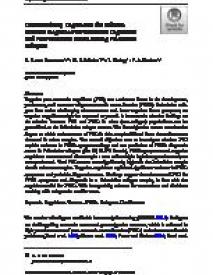Contextualizing Cognitions : the Relation Between Negative Post-traumatic Cognitions and Post-traumatic Stress Among Palestinian Refugees
Negative post-traumatic cognitions (PTC) are a relevant factor in the development, persistence, and treatment of post-traumatic stress disorder (PTSD). Palestinian refugees live under challenging circumstances and have negative future prospects, so negative cognitions might be expected to prevail. It is uncertain whether findings on the relation between PTC and PTSD in other (non-refugee) populations can be generalized to the Palestinian refugee context. The first objective was to examine the degree to which endorsement of PTC in this sample differed from the endorsement observed in other samples. The second objective was to investigate whether PTC explain variance in PTSD symptomatology and are predictive of PTSD diagnostic status. In Palestinian refugees (N = 85, 51.8% female), PTSD symptoms and negative cognitions were assessed. One sample t tests and multiple logistic regression analyses were performed. Total PTC scores were significantly higher in the Palestinian sample than in reference samples. Negative cognitions explained significant variance in PTSD symptoms and probable diagnostic status. Findings support the relevance of PTC for PTSD symptoms and diagnosis in a Palestinian refugee sample, in line with the cognitive model for PTSD. This is especially relevant for researchers and clinicians working with refugees in conflict areas.
Geachte bezoeker,
De informatie die u nu opvraagt, kan door psychotraumanet niet aan u worden getoond. Dit kan verschillende redenen hebben,
waarvan (bescherming van het) auteursrecht de meeste voorkomende is. Wanneer het mogelijk is om u door te verwijzen naar de bron
van deze informatie, dan ziet u hier onder een link naar die plek.
Als er geen link staat, kunt u contact opnemen met de bibliotheek,
die u verder op weg kan helpen.
Met vriendelijke groet,
Het psychotraumanet-team.
In: International Journal of Cognitive Therapy , ISSN : 1937-1217 | 13 | 2 | 159-172
https://link.springer.com/article/10.1007%2Fs41811-020-00066-7


